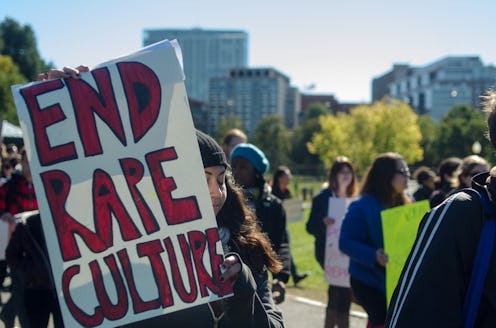Life
Reports Of Campus Rape Spike On These Days

Campus rape and campus sexual assault have continued to receive a lot of necessary attention in 2015, a trend that hopefully continues into the new year. The increased attention also means that we're learning more and more about the problem — for instance, a new study suggests that rape reports on campus increase after football games. Which, sadly, makes a lot of sense, given that both football and sexual assault on campus are connected to alcohol and partying.
The study, which was released by the National Bureau of Economic Research, found that on game days for colleges with Division I football programs, rape reports made in the local policing area by victims ages 17 to 24 spiked sharply. In fact, on average, reports went up by 28 percent — and 41 percent during home games. Given that there are 128 colleges and universities who play in the top football division, this theoretically amounts to somewhere between 253 and 770 additional rapes of college women per year, according to the researchers calculations. Which is awful.
The researchers hypothesize that this is due to the increased alcohol consumption and partying that happens after games, particularly wins. And researchers hope that this will encourage schools to make an effort to discourage spikes in drinking on campus, whether schools play Division I football or not.
"We view these results as contributing to a more complete understanding of the nonpecuniary costs associated with college football," the researchers write in the study's conclusion. They continue:
Moreover, by documenting how specific contexts modify the effects of football games on the incidence of rape … our results can inform awareness and prevention efforts. That being said, we recognize that college football games are but one component of a college culture that contributes to excessive partying. Therefore, these results can be viewed as highlighting the potentially large effects on rape that can result from various policies and activities that alter the social context.
In other words, any major social events on campus that involve widespread drinking and partying are something universities should be aware of.
Ultimately, of course, the root causes of rape on campus are not widespread alcohol consumption — if that were the case, rape wouldn't be a problem in countries where alcohol is outlawed, such as Saudi Arabia. The root causes of sexual assault, on campus and elsewhere, are things like a lack of education around sex and consent in our culture, a society that encourages men to be aggressive in pursuing sex, and the devaluation of women and our right to body autonomy — among other problems.
However, this most certainly doesn't mean that colleges and universities shouldn't take steps to protect their students, including recognizing that most rapes on campus involve alcohol, and that therefore events which typically involve heavy drinking by a large number of students are also times when sexual assault is more likely to occur. And these results emphasize that schools with prominent football programs should be especially aware of this fact.
So will we ever manage to fix the massive problem of campus sexual assault — or sexual assault in general? I don't know, but findings like this, depressing as they may be, are a step in the right direction.
Images: CMCarterSS, cascade_of_rant/Flickr